初中英语语法专题(三) 限定词(二)(word版)
- 格式:docx
- 大小:110.57 KB
- 文档页数:10
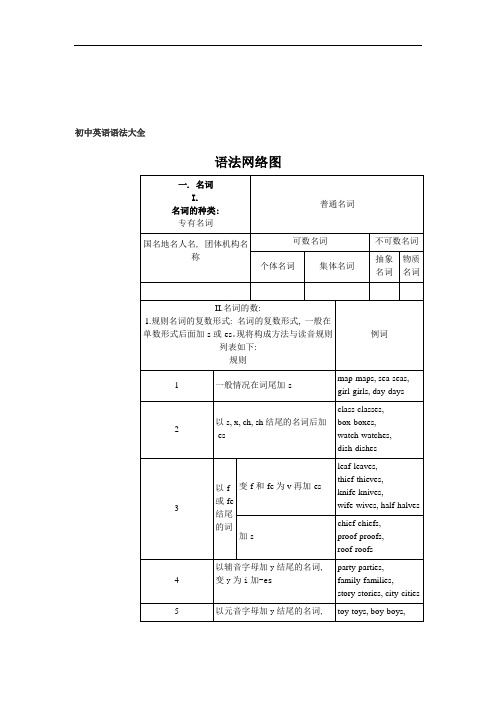
初中英语语法大全语法网络图十二。
倒装句十三。
虚拟语气十四。
重要句型1.It was not until midnight that he finished his task.2.Not until he came back from abroad was I able to see him again. 3.The harder you work, the greater progress you will make.4.He walked around the house, gun in hand.5.May you be in good health!6.Wish you a pleasant journey back home!7.The professor was a humorous man with big nose and deep-set eyes.8.What surprised me most was his imagination and patience.9.He lay on the grass, with his eyes looking at the sky and his hands under his head. 10.Sitting under the tree are Mr.Green and his first teacher.11.On the wall hang two pictures of famous scientists.12.Looking back upon those past years, he couldn’t help feeling very proud.13.No sooner(Hardly) had he arrived at the theatre than(when) the play started.14.Young as he is, he has learned advanced mathematics.15.How I regret the hours wasted in the woods and fields!16.There stands a beautiful vase in the corner of the room.17.Ten miles north of the town lies a paper factory.18.There goes the bell.19.Nowhere has the world ever seen such a bird as here.20.It is no use crying for help.21.If only I had been your student in the middle school!22.It is believed that such a thing will not happen again.23.Only when he explained did I realize the reason for this.24.“He works particularly hard.”“So he does, and so do you.”25.Not only Alice but also Jane and Mary are tired of having one examination after another.26.Such was Albert Einstein, a simple person of great achievements.十五。
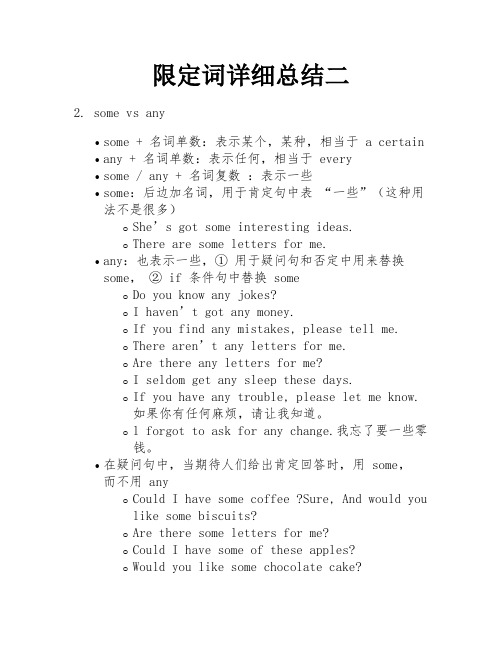
限定词详细总结二2. some vs any•some + 名词单数:表示某个,某种,相当于 a certain •any + 名词单数:表示任何,相当于 every•some / any + 名词复数:表示一些•some:后边加名词,用于肯定句中表“一些”(这种用法不是很多)o She’s got some interesting ideas.o There are some letters for me.•any:也表示一些,① 用于疑问句和否定中用来替换some,② if 条件句中替换 someo Do you know any jokes?o I haven’t got any money.o If you find any mistakes, please tell me.o There aren’t any letters for me.o Are there any letters for me?o I seldom get any sleep these days.o If you have any trouble, please let me know.如果你有任何麻烦,请让我知道。
o l forgot to ask for any change.我忘了要一些零钱。
•在疑问句中,当期待人们给出肯定回答时,用 some,而不用 anyo Could I have some coffee ?Sure, And would youlike some biscuits?o Are there some letters for me?o Could I have some of these apples?o Would you like some chocolate cake?•当 some 与单数可数名词搭配时, some 相当于 acertain (“某一”) 的含义; 而 any 与单数可数名词搭配,则相当于every (“任何一个”〕的含义。
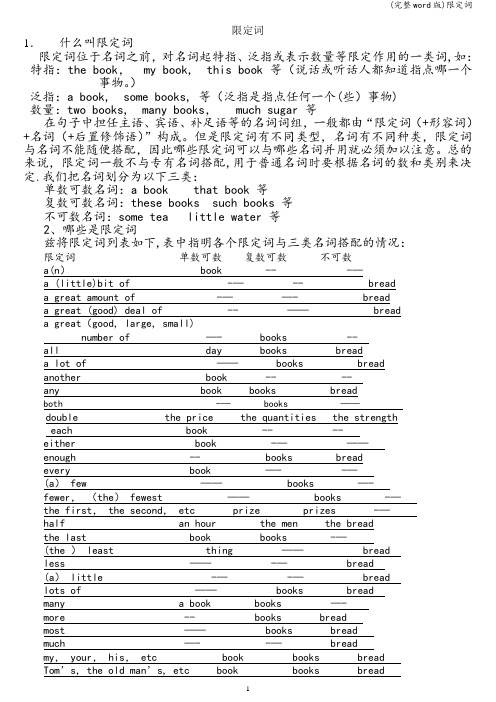
限定词1.什么叫限定词限定词位于名词之前,对名词起特指、泛指或表示数量等限定作用的一类词,如:特指:the book, my book, this book 等(说话或听话人都知道指点哪一个事物。
)泛指:a book, some books, 等(泛指是指点任何一个(些)事物)数量:two books, many books, much sugar 等在句子中担任主语、宾语、补足语等的名词词组,一般都由“限定词(+形容词)+名词(+后置修饰语)”构成。
但是限定词有不同类型,名词有不同种类,限定词与名词不能随便搭配,因此哪些限定词可以与哪些名词并用就必须加以注意。
总的来说,限定词一般不与专有名词搭配,用于普通名词时要根据名词的数和类别来决定.我们把名词划分为以下三类:单数可数名词:a book that book 等复数可数名词:these books such books 等不可数名词:some tea little water 等2、哪些是限定词兹将限定词列表如下,表中指明各个限定词与三类名词搭配的情况:限定词单数可数复数可数不可数a(n) book -- -—a (little)bit of -— -- breada great amount of -——- breada great (good) deal of -- —— breada great(good, large, small)number of —- books --all day books breada lot of —— books breadanother book -- --any book books breadboth -— books ——double the price the quantities the strengtheach book -- --either book -———enough -- books breadevery book —- -—(a) few —— books —-fewer,(the) fewest —— books -—the first, the second, etc prize prizes -—half an hour the men the breadthe last book books -—(the ) least thing —— breadless —— -— bread(a) little -— -— breadlots of —— books breadmany a book books —-more -- books breadmost —— books breadmuch —- -— breadmy, your, his, etc book books breadTom’s, the old man’s, etc book books breadneither book -- --the next book books --no book books breadone book ———-one-third, two—fifths, etc (of)the book (of) the books the timeother student students breadthe other book books --plenty of —- books breadseveral -- books --some (某一)book books breadsuch book books breadthat book books breadthe book books breadthese -— books —-this book -— breadthose -- books ——twice, three times, etc the figure the quantities his strengthtwo, three, etc —- books --what(ever) book books breadwhich(ever) book books breadwhose book books breadzero(不用冠词或其它限定词) man men bread[注] 表内“-”表示有关限定词不能与该类名词搭配.限定词的搭配 1、概说名词词组中,当两个或两个以上的限定词同时出现时,限定词之间有一定的搭配关系,根据其不同的搭配位置可分为三类,其中最重要的一类是中位限定词,:Write your answer on every other line。
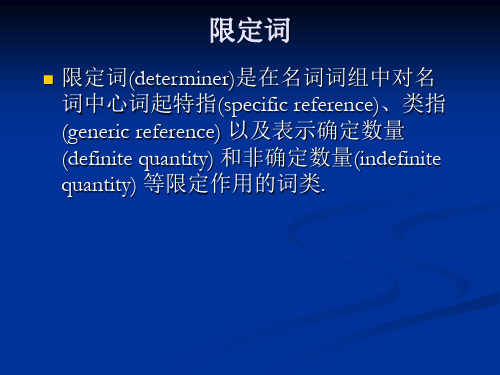
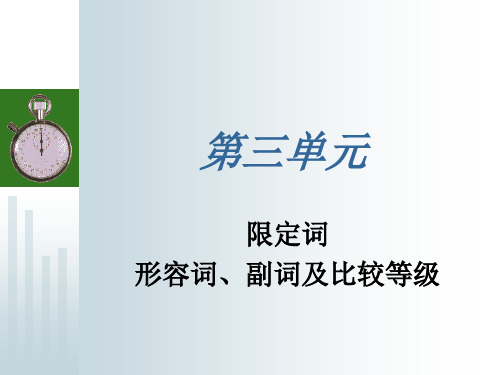
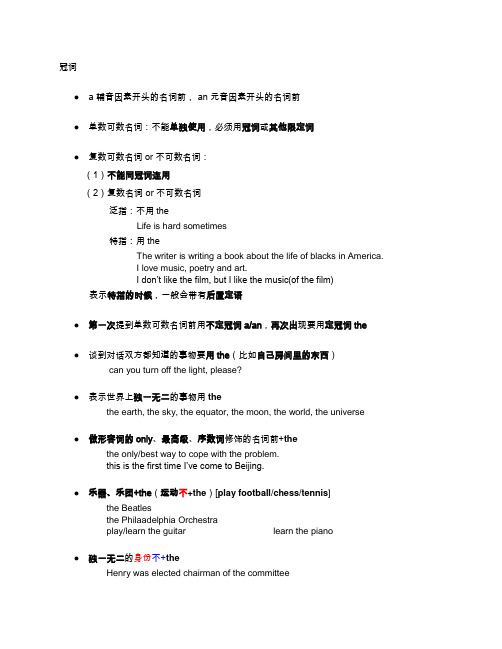
冠词● a 辅音因素开头的名词前, an 元音因素开头的名词前●单数可数名词:不能单独使用,必须用冠词或其他限定词●复数可数名词 or 不可数名词:(1)不能同冠词连用(2)复数名词 or 不可数名词泛指:不用theLife is hard sometimes特指:用theThe writer is writing a book about the life of blacks in America.I love music, poetry and art.I don’t like the film, but I like the music(of the film)表示特指的时候,一般会带有后置定语●第一次提到单数可数名词前用不定冠词a/an,再次出现要用定冠词the●谈到对话双方都知道的事物要用the(比如自己房间里的东西)can you turn off the light, please?●表示世界上独一无二的事物用thethe earth, the sky, the equator, the moon, the world, the universe●做形容词的only、最高级、序数词修饰的名词前+thethe only/best way to cope with the problem.this is the first time I’ve come to Beijing.●乐器、乐团+the(运动不+the)[play football/chess/tennis]the Beatlesthe Philaadelphia Orchestraplay/learn the guitar learn the piano●独一无二的身份不+theHenry was elected chairman of the committeeFor the first time I am king of myself●限定词彼此互斥,不能同时出现在名词前面(1)冠词:the an a(2)物主形容词: my your his her our their(3)指示形容词: this that these those(4)名词属格:Tom’s John’s●特殊名词前省略the(1)nature : in nature (2)society: in society (3)space: in space(4)man在泛指整个人类时,不加冠词(5)history在泛指整个历史时,不加冠词(6)三餐前不+冠词:have something for breakfast/lunch/supper/dinner●交通工具若用介词on:+冠词the(on foot 步行不加the)on the train/plane/boat若不用介词on,如用by时,不加the: by bicycle/boat/bus/car/plane/train/metro●其他固定介词搭配face to face , arm in arm , hand in hand , shoulder to shoulder , side by sideinch by inch , day after day , dentist after dentist●school/the schoolbed, church, court, hospital, prison, school/college/unversity, sea, work, office 当人们去这些地方做在这些地方应该做的事情时,不加冠词,表示抽象概念当要去这些地方不是要做特定的事,而是由于其他原因,要用thehis mother is in hospital and he has been in the hospital to take care of her.Bill Blinton came into office in 1992./Bill Clinton came into the office and saw sth. to church(to pray)to hospital(as patients)to/at sea(出海/在海上)to/at/from(去上班/在上班/下班)go to sea(as sailors) go to the sea(go to the seaside)be at sea(as passengers or crew) be at the sea(be at the seaside)by sea(by ship)by the sea(by the seaside)be in office(在任职) be in the office(在办公室里)be out of office(离职) be out of the office(离开办公室)●泛指的四种表达1.不带the的不可数名词I like music2.不带the的复数可数名词bananas are yellow I am afraid of dogs3.the+单数可数名词(也可表示特指)the whale is the largest mammal on earththe whale is dead4.a/an+单数可数名词(也可以表示一个)I ate a banana this morningA banana is yellow。
专题三第三讲限定词(二)在英语中,限定词是在名词词组中对名词中心词起特指、泛指(冠词),表示确定数量(数词)和非确定数量(不定代词)等限定作用的词类.名词词组除有词汇意义外,还有其所指意义, 是特指(即指特写的对象〕,还是泛指(即泛指一类人或物〕;是有确定的数量,还是没有确定的数量.表示名词的非确定数量的不定限定词有(不定代词):n o, some, any, each, every, enough, either, neither, all, both, half, several, many, much, (a) few, (a) little, other, another 等.接下来我们分类一一讲解。
数量限定词(一): a few,few/a little,little(四个小不点)与名词的搭配关系: a few 和few 的后面只能接复数名词,而 a little 和little 的后面只能接不可数名词。
例如: a few days, few boys a little water, little money肯定/否定之别: a few 和a little 的意思是肯定的,相当于some,表示“有一些”的意思。
而few 和little 的意思是否定的,表示“很少,几乎没有”。
例如:His theory is rather difficult; few people understand it.=His theory is rather difficult; almost no people understand it. 他的理论很深奥,没什么人能够理解。
His theory is rather difficult, but a few people understand it. 他的理论很深奥,但有一些人能够理解。
Ihave little interest in English, so I am very poor at it. 我对英文没什么兴趣,所以学得很不好。
限定词讲义Determiner (限定词)限定词是在名词词组中对名词中心词起特指、类指以及表示确定数量和非确定数量等限定作用的词类。
英语的限定词包括:冠词(the, a, an)、物主限定词(my, your, his, her, our, your, their, one’s, its)名词属格(Sophie’s, my friend’s)指示限定词:this, that, these, those, such关系限定词:whose, which疑问限定词:what, which, whose不定限定词:no, some, any, each, every, enough, either, neither, all, both, half, several, many, much, (a) few, (a) little, other, another基数词:one, two,…序数词:first, second…倍数词、分数词量词:a lot of, lots of, plenty of, a great/good deal of, a large/small amount/quantity of, a great/large/good number of 等。
专业四级主要考点:限定词与限定词之间的搭配关系。
即如果在名词词组中心词之前如果有两个或两个以上限定词出现时,就会产生限定词的先后顺序问题。
按其不同的搭配位置,限定词分为前位限定词、中位限定词和后位限定词。
前位限定词包括all, both, half, double, 倍数词、分数词、what、such (a/an)等。
中位限定词包括:冠词、指示限定词、物主限定词、名词属格; some, any, no, every, each, either, neither, enough; what(ever), which(ever), whose.后位限定词包括:基数词、序数词;next, last, other, another,etc; many, much, (a) few, (a) little, fewer, less, least, more, most; several, plenty of, a lot of, lots of, a great/good deal of, a large/small amount/quantity of, a great/large/good number of; such等前位——中位——后位all the four teachersall your three booksall these last few dayshalf his lecturethose last few monthsseveral hundred guestsall other studentssuch a misfortunesome such alloy练习:1.The additional work will take ( ) weeks.A. the otherB. another fiveC. other fiveD. the more2. He did it in ( ) time it took me.A. the one-thirdB. half aC. the doubleD. one-third the3. I saw ( ) boys at the cinema.A. the bothB. many aC. both theD. the several4. ( ) candidates are girls.A. Half theB. The halfC. Their halfD. Half a5. He was on leave ( ) days.A. the few lastB. few anotherC. few otherD. the last few6. ( ) friends usually speak highly of him.A. His someB. His manyC. Many hisD. Some his7. Please serve me ( ) soup.A. more someB. the lessC. more theD. some more8. ( ) alloy may be used to replace copper.A. Such aB. Some suchC. Such someD. Several such9. Please send ( ) samples to London by air.A. these enoughB. five theseC. enough theseD. these five10. Are you going to buy ( ) rice?A. all theseB. these allC. all thisD. both these11. They want at least ( ) salaries.A. their doubleB. double theirC. enough theirD. their enough12. ( ) dictionary is enough for me.A. Such oneB. One suchC. Such a oneD. One such a13. ( ) factors should be considered.A. These allB. Such allC. All suchD. Some these14. ( ) evenings he did enjoy himeself immensely.A. The first fewB. The few firstC. The first someD. Some the first15. ( ) meat is tainted.A. That one-thirdB. One-third thatC. Such aD. Few such16. ( ) boys were in the classroom.A. All five otherB. Other allC. All the moreD. All the other five17. He has been staying at home ( ) days.A. these all last fewB. these last few allC. all these last fewD. these last all few真题:1.Which of the following is INCORRECT? (2008)A.All his lectures were boring.B.Half his money was goneC.Her few friends are all fond of dancingD.He invited many his friends to the party2. A new laptop costs about ( ) of a second-hand one.(2009)A.the price of three timesB. three times the priceC.as much as the three times priceD. three times more than the price从属结构(限定分句、非限定分句、无动词分句、独立结构)1. ( ) mainly for the invention of the telephone, Alexander Graham Bell devoted his life to helping the deaf.A He is rememberedB To rememberC While rememberingD Though remembered2. The policy ( ) made, the next problem was how to carry it out.A having beenB beingC had beenD was3. Weather ( ), we’ll go for an outing.A being permittedB permittedC permittingD permits4. ( ) the opportunity, he might well have become an outstanding cartoonist.A GivenB To giveC GivingD Being given5. He wasn’t asked to take on th e chairmanship of the society, ( ) insufficiently popular with all members.A. having consideredB. was consideredC. was being consideredD. being considered6. ( ) in an atmosphere of simple living was what her parents wished for.A. The girl to be educatedB. The girl educatedC. The girl’s being educatedD. The girl was educated7. No matter how frequently ( ), the works of Beethoven always attract large audience.A. performedB. performingC. to be performedD. being performed8. After the Arab states won independence, great emphasis was laid on expanding education, with girls as well as boys ( ) to go to school.A. to be encouragedB. been encouragedC. being encouragedD. be encouraged9. ( ) their work will give us a much better feel for the wide differences between the two schools of thought.A. To have reviewedB. Having reviewedC. ReviewingD. Being reviewed10. If the building project ( ) by the end of this month is delayed, the construction company will be fined.A. being completedB. is completedC. to be completedD. completed11. ( ) in the United States, St. Louis has now become the 24th largest city.A. Being the fourth biggest cityB. It was once the fourth biggest cityC. Once the fourth biggest cityD. The fourth biggest city it was12. There are only ten apples left in the baskets, ( ) spoilt ones.A. not countingB. not to countC. don’t countD. having not counted13. ( ) at in his way, the situation doesn’t seem to desperate.A. LookingB. LookedC. Being lookedD. To lookProfessor Johnson is said ( ) some significant advance in his research in the past year.A. having madeB. makingC. to have madeD. to make14. This missile is designed so that once ( ) nothing can be done to retrieve it.A.firedB. being firedC. they firedD. having fired15. ( ) no cause for alarm, the old man went back to his room.A. There wasB. SinceC. BeingD. There being16. The three men tried many times to sneak across the border into the neighbouring country, ( ) by the police each time.A. had been capturedB. being always capturedC. only to be capturedD. unfortunately captured.17.. The sale usually takes place outside the house, with the audience ( ) on benches, chairs or boxesA. having seatedB. seatingC. seatedD. having been seated18 “How did the group improve its discussion”“They all took part, each member ( ) the responsibility of leading one meeting.”A. having B to have C. has had D. has19.These surveys indicate that many crimes go ( ) by the police, mainly because not all victims report them.A. unrecordedB. to be unrecordedC. unrecordingD. to have been uncorded20.. It’s no use ( ) with her. You might as well ( ) with a stone wall. She is incapable of seeing any one else’s point of view.A. arguing; arguingB. argue; argueC. to argue; arguingD. arguing; argue21. The naughty girl said to her parents that she wanted to be a good girl and set her heart ( ) a trail of her own.A. to blazingB. to blazeC. blazedD. blaze22. The teacher walked into the classroom ().A. with a book in handB. hand with a bookC. being with a book in handD. to have a book in hand23. We left the meeting, there obviously () no point in staying.A. wereB. beingC. to beD. having24. The mother didn’t know who ( ) for the broken glass.A. blamedB. would blameC. to blameD. be blamed25. He rushed into the room, his face ( ) with sweat.A. drippingB. drippedC. being drippedD. was dripping限定分句真题归纳:( ) dull he may be, he is certainly a very successful top executive.(2006)A.AlthoughB. WhateverC.AsD. HoweverThe party, ( ) I was the guest of honor, was extremely enjoyable.(2006)A.by whichB. for whichC. to whichD. at whichThe research requires more money than ( ) (2007)A.have been put in B. has been put in C. being put in D. to be put in( ) he wanted to go out with his friends at the weekend, he had to stay behind to finish his assignments.(2008)A.Much thoughB. Mush asC. As muchD. though much未完待续倒装倒装是一种语法手段,用以表示一定句子结构的需要和强调某一句子成分的需要。
专题三第三讲限定词(二)在英语中,限定词是在名词词组中对名词中心词起特指、泛指(冠词),表示确定数量(数词)和非确定数量(不定代词)等限定作用的词类.名词词组除有词汇意义外,还有其所指意义, 是特指(即指特写的对象〕,还是泛指(即泛指一类人或物〕;是有确定的数量,还是没有确定的数量.表示名词的非确定数量的不定限定词有(不定代词):n o, some, any, each, every, enough, either, neither, all, both, half, several, many, much, (a) few, (a) little, other, another 等.接下来我们分类一一讲解。
数量限定词(一):a few,few/a little,little(四个小不点)与名词的搭配关系:a few 和few 的后面只能接复数名词,而a little 和little 的后面只能接不可数名词。
例如: a few days, few boys a little water, little money肯定/否定之别:a few 和a little 的意思是肯定的,相当于some,表示“有一些”的意思。
而few 和little 的意思是否定的,表示“很少,几乎没有”。
例如:His theory is rather difficult; few people understand it.=His theory is rather difficult; almost no people understand it. 他的理论很深奥,没什么人能够理解。
His theory is rather difficult, but a few people understand it. 他的理论很深奥,但有一些人能够理解。
Ihave little interest in English, so I am very poor at it. 我对英文没什么兴趣,所以学得很不好。
I have a little interest in English, so I like learning it. 我对英文有些兴趣,所以我喜欢学。
与only 或very 的搭配关系我们只能说:only a little 或only a few,而不能说:only few*或only little*。
但为了强调否定意义,我们可说:very few 或very little。
我们来分析下面这道题:His theory is rather difficult and students can understand it.A . only fewB only a few C.only little D.only a little数量限定词(二):some/any与名词的搭配关系:some 和any 均可以与不可数名词及可数名词复数连用,表示“一些”。
some 一般用在肯定句中,而any 一般用在否定句中。
I want to buy some computer books. 我想买几本计算机书。
I don't have any friends here. 我在这里没有朋友。
在疑问句中,我们多数情况下用any,但是在表示我们期待一个正面的回答或要鼓励对方说“是”时,要在疑问句中用some。
例如:Have you got any medicine to cure your cough? 你吃治疗咳嗽的药了吗?Would you like to give me some advice? 你想给我提点建议吗?除了上述与不可数名词及复数名词搭配外,some 和any 都可以与单数名词搭配,此时均有特殊的含义和用法。
具体详述如下。
特殊用法一:any 与单数名词搭配当any 的后面接单数名词时,它的意思是“无论哪一个,任何一个”,此时可用于任何类型的句子。
You can catch any bus. They all go to the railway station.You can ask any person over there. They all can tell you.特殊用法二:some 与单数名词搭配some 可与单数可数名词连用,这时的some 表示不确定的“某一个”的意思。
Some person at the gate is asking to see you. 门口有个人要见你。
特殊用法三:some 与数词连用在限定复数名词时,some 的后面还可以先接一个数词,然后再接名词,此时some 表示“大约”的意思。
这一用法常常暗指这是一个给人以深刻印象的很大的数字。
Some 1,500 passengers and crew died aboard the Titanic when it sank on April 14, 1912.在“泰坦尼克”号游轮于1912 年4 月14 日沉没之后,船上大约有1,500 名乘客和船员丧生。
个体限定词(一): each/every与名词的搭配关系: each 和every 的后面都只能接单数可数名词,不能修饰不可数名词和复数名词。
比如我们说:every/each boy,而不说:every/each boys*。
此时若作主语,句子的谓语动词要用单数。
Each boy has a gift. 每个男孩都有礼物。
Every man is the master of his own fortune. 每个人都是自己命运的主宰。
与数词的搭配关系:一般来说,each 不与数词连用,而every 可与数词连用,然后再加复数名词。
every two days “每隔一天”还可以说成every other dayevery four years 每隔三年/每四年二者用法上的差异:1.二者在词性上的差别二者最大的区别是:each 不仅用作限定词,而且也可用作代词;而every 只能用作限定词。
即each 用作代词可以单独使用,而every 只能与名词连用,不能单独使用。
Each has a gift. 却不能说:Every has a gilt.* 人人都有礼物。
2.二者在意思上有两点区别首先,each 可以用来指两个或两个以上的事物。
而every 却总是指三个或三个以上的事物,不能指两个。
(见三三PK 两两)其次,every 强调整体,相当于all 的意思;而each 则表示个别的概念。
当我们用each 时,我们强调的是一个一个不同的人或事物。
There are a lot of trees on each side of the street. 不能说:...every side...*We want every student to succeed in the exam.Each student has his own personal dream in his mind.个体限定词(二):another/other与名词的搭配关系:another 不能修饰不可数名词及复数名词,只能与单数可数名词连用,表示不确定的“另一个”,“再一个”。
other 可与单数名词、复数名词以及不可数名词连用,表示不确定的“另外的”,“其余的”人或物。
another day another cup of water the other boy other boys other water 与数词的搭配关系:二者都可以与数词连用,但在语序和意思上都不相同。
数词要置于another 的后面,但要放在other 的前面。
即another+数词+复数名词数词+other+复数名词两种结构所表达的意思完全不同。
前者的基本意思是“在原有基础上的一个延续”,而后者单纯地表示“其他的,另外的”。
another three days three other days three more days 另外三天总之,“another+数词+名词复数”结构强调的是数量概念。
比如another three days 表示“接下来还有三天”,是一个量的累积。
而“数词+other+复数名词”结构强调的是类别概念。
比如three other days 表示“其他三天”,说明的是特定的某三天,而不是一个数量的概念。
另外,与“another+数词+名词复数”这一结构意思相同的另一种结构是:“数词+more+复数名词”。
other 本身的其他用法1.other 之前可以有其他限定词修饰常见的置于other 前面的限定词包括:some,any,every,enough,one/two/three…,no,many 和his/my/their 等。
Have you got any other colors? 你这里有别的颜色吗?I have many other books for you to read. 我还有许多其他的书供你看。
2.词尾不带-s 的other 只能作限定词来用,其后面必须接名词,而不能单独使用。
与此相反,others 只能用作代词,后面不能再接名词,而只能单独使用。
(类似于形物代与名物代的区别)3.“other+名词”表示不确定的“其他的,另外的”。
若有了定冠词the 限定,“the other+名词”则表示特定范围内的“剩下其余的”。
简言之,other 表示不确定的,the other 表示确定的。
这一区别同样适用于others/the others。
个体限定词(三):either/neither(1/2 和0/2)与名词的搭配关系: 二者都是与单数可数名词连用,谓语动词用单数,不能再与其他的限定词(如冠词、物主代词或指示形容词等)连用。
Either day is OK. (不说:...are OK.)Neither day is OK. (不说:...are OK.)用作代词:二者不直接接名词,而是单独使用或接of 短语。
与of 短语连用时的结构:“either/neither of+限定词(如冠词、物主代词或指示形容词)+名词复数+单数谓语动词”。
Either of the answers is right. 两个答案都对。
Neither of my children has done that. 我的两个孩子都没做那件事。
词义差别: 这两个词的词义不同。
either 有两个意思。
either 的基本意思是“两个当中的任何一个”,“这个或那个”,either 有时候也指“两个中的每一个”,特别是在与end 和side 连用时;neither 只有一个意思,即“两者都不”。